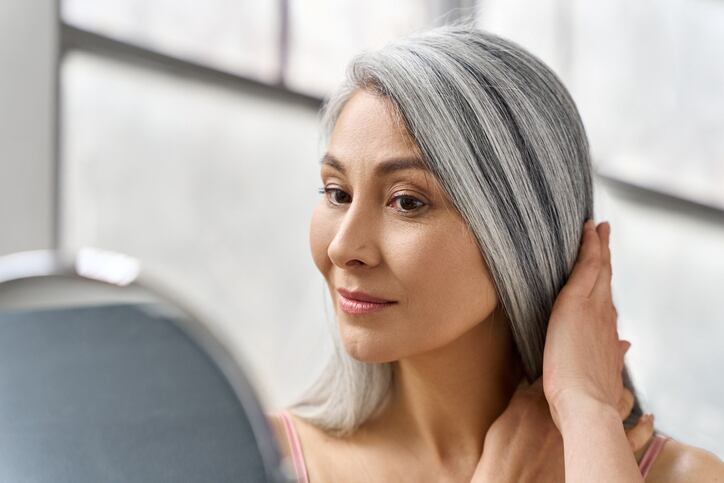The latest research from wellness company Nutrafol was recently presented at The North American Menopause Society (NAMS) Annual Meeting in Washington, DC.
The new study, funded by Nutrafol manufacturer Nutraceutical Wellness, suggests that nutrient-derived bioactive compounds found in Nutrafol’s Women’s Balance may effectively promote hair growth in women whose hormone changes are associated with decreased hair growth.
“Hair thinning is multifactorial, and as such the supplement is formulated with multiple standardized and bio-optimized ingredients that have been specifically selected for their clinical properties and efficacy in addressing these underlying causes, including hormonal shifts, stress, aging, nutrition, environment, oxidative damage and immune responses,” explained lead author Dr. Glynis Ablon of the Ablon Skin Institute and Research Center in California.
Ingredients
“Nutrafol Women’s Balance is formulated with ingredients that address key root causes of thinning hair to improve hair growth. For instance, saw palmetto which was increased in this formulation, is clinically shown to be an effective dihydrotestosterone inhibitor, while ashwagandha is potent stress adaptogen that has been shown to balance elevated cortisol levels in stressed adults. Additionally, maca is a sex hormone adaptogen that has been used for thousands of years to help women through the menopausal transition and had shown clinical benefits as such. The influence of these ingredients is in their ability to specifically address underlying triggers of hair thinning during this time. [It’s] formulated with natural ingredients also known to help lower frequency of hot flashes and night sweats, improve sleep quality, mood, and skin health,” Ablon said.
The study
The study included 60 subjects, with 33 supplemented with Nutrafol Women’s Balance and 27 received placebo. Subjects had an overall mean age of 55 years old.
This was a 6-month randomized, double-blind, placebo-controlled trial with a 6-month open label extension phase, whereupon placebo subjects were crossed over to active treatment. The interim 6-month results showed statistically significant improvements in hair growth and shedding compared to placebo.
The full 12-month study period, including the extension phase, consisted of six clinic visits at baseline, day 90, 180, 270 and 360. Phototrichograms were obtained of the target area during each visit via macrophotography for hair count analysis. Hair wash shed count was also conducted at each visit. During each clinic visit, 2-dimensional standardized global photographs were obtained of the entire head, hair and target region. Two-D images were used to assist a blinded investigator in grading general hair growth and hair quality (texture, shine, dryness, scalp coverage, hair brittleness and overall appearance) improvement from baseline.
Findings
Researchers compared results at 6 months and 12 months of treatment and found that mean total hair counts increased and hair shedding decreased in perimenopausal, menopausal, and postmenopausal women.
“Nutrafol’s double-blind placebo-controlled randomized clinical trial showed significant increase in hair growth vs placebo as measured by hair counts, also decreased shedding, and showed clinical improvement assessed by a blinded investigator progressively through 6 months. The most recent results from the open-label extension period showed that these improvements continued beyond 6 months through the 12 month period. Likewise, previously placebo patients who crossed over to the active therapy showed improvement as well,” noted Ablon.
For subjects in the active treatment group for 12 consecutive months, mean total hair counts increased from Day 0 to 360, culminating in a mean increase of 11.7%. Global hair growth improvement ratings increased by 43% from Day 90 to 180 and 25% from Day 90 to 360. Global hair quality improvement ratings increased by 24% from Day 90 to 180 and by 37% from Day 90 to 360. Subjects who were initially in the placebo group had a 5% increase in hair growth and a 39% decrease in shedding from day 180 to 360 when they were switched over to the active treatment. Global hair growth improvement ratings across 6-month of active treatment for this group increased by 30% versus 11% when they were taking placebo. Global hair quality improvement ratings increased by 40% versus 11% when they were taking placebo.
“I think it is exciting to have the first ever study on nutraceuticals and menopausal transition hair loss. We are what we eat and that includes our hair health. Looking at nutritional status for many dermatologic conditions including hair loss is imperative and I think nutraceuticals are just beginning to take off,” Ablon told NutraIngredients-USA.
Source: The North American Menopause Society (NAMS) Annual Meeting
Washington, DC September 22-25, 2021
“Long-term Efficacy of a Nutraceutical Supplement for Promoting Hair Growth in Perimenopausal, Menopausal and Postmenopausal Women with Self-Perceived Thinning Hair”
Authors: G. Ablon et al.

